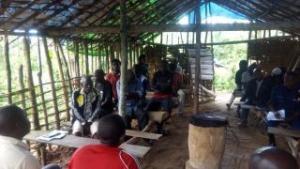Since the implementation of ITSCI at the Kalay Boeing mine site in the Walikale Territory, of the North Kivu Province, DRC, miners were able to sell to the international market, becoming a critical livelihood provider for the local community.
However, in January 2017, members of the non-state armed group Maï-Maï Simba, led by the self-proclaimed “General” Mando, arrived at the mine site, presumably to take control of activities and collect illegal taxes. As an immediate measure, ITSCI suspended tagging at the site, preventing miners from working.
Walikale’s customary leaders decided that diplomacy with Mando was their best option for maintaining peace and restoring mining activities. They successfully advocated for the Maï-Maï leader to participate in a local multistakeholder committee (CLS) meeting. The meeting, chaired by the administrator of Walikale, took place in February 2017. The group’s stakeholders talked to Mando about due diligence, the issue of conflict minerals and ITSCI’s standards and importance. The meeting successfully convinced Mando to openly commit to not return to Kalay Boeing or collect taxes.
“This is a great success story,” says Meshe Mukulumanya, head of SAEMAPE office. “We as stakeholders and the local community successfully convinced a rebel leader to withdraw from the mine site. In the past, even some NGOs or FARDC did not manage to achieve this.”

Local Stakeholder meeting in Kalay Boeing
[Photo: Pact]
